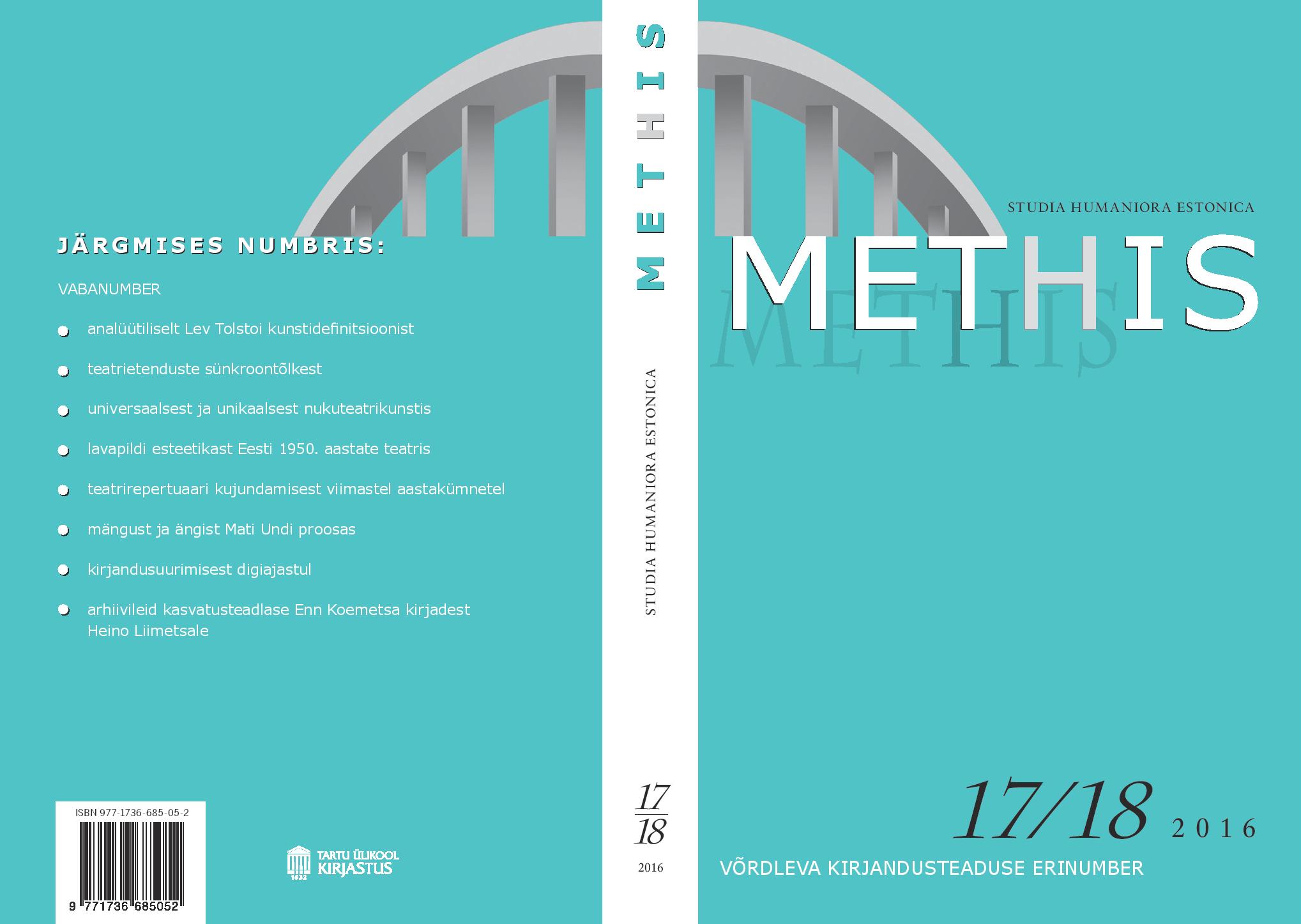Jüri Talveti filoloogiline teekond: hispaaniakeelsest maailmast Eestisse ja tagasi / Jüri Talvet’s Philological Journey: from the Spanish-speaking World to Estonia and Back
DOI:
https://doi.org/10.7592/methis.v14i17/18.13209Keywords:
hispanistika Eestis, võrdlev kirjandusteadus, süntees, semiosfäär, Spanish studies in Estonia, comparative literary science, synthesis, semiosphereAbstract
Teesid: Artikkel esitab bio-bibliograafilise ülevaate luuletaja, esseisti, kirjandusteadlase, tõlkija ning õppejõu Jüri Talveti (s 1945) loomingulisest teest. Talveti kui erakordselt laiahaardelise loomingulise isiksuse panus hispaaniakeelse kirjandusruumi vahendamisel ja uurimisel Eestis on jätnud püsiva jälje. Tema viljeldava komparativismi keskmeks olev võrdlus ei piirdu üksnes võrreldavate objektidega, vaid viib põimumiste ja mõjutuste väljaselgitamisele ning uue sünteesini. Niisugune lähenemine võimaldab Talvetil esitada mitmeid eesti kirjanduskultuuri keskseid autoreid ja teoseid maailmakirjanduslikus kontekstis. Luuletajana esindab Talvet hingestatud intellektuaalsust, milles intertekstuaalsed osutused toimivad kultuuridevahelise sillana.
The article presents a bio- and bibliographical overview of the creative work of Jüri Talvet (born in 1945) – a poet, essayist, literary scholar, translator and university professor. The creative scope of Talvet is exceptionally wide and his decades-long contribution to the mediation and exploration of the Spanish-speaking literary space in Estonia has left permanent traces. The comparative method cultivated by Talvet does not border merely on the literary texts considered but lead to the establishment of reciprocal impact and a new level of synthesis. Terms such as “symbiosis”, “symbiotic unity” and “synthesis” play an important role in Talvet’s contemplations of life, literature and culture; they are not only part of his epistemological ’toolkit’ but also represent a relation of value. In the semiotic approach such discourse may be viewed as the replacement of binary structure with a ternal one, a change elaborated already by Talvet’s most famous colleague Juri Lotman in 1992 when his intellectual testament Culture and Explosion was published: “Ternal structures retain certain values of the previous period by shifting them from the periphery into the centre.” For Talvet “the greatest literature of all times” has a symbiotic basis. Talvet’s approach to different literary cultures has enabled him to present several central authors of Estonian literary culture and their work in the context of world literature. One of the most outstanding results of such process is the re-discovery and re-conceptualization of the personality and the creative work of Juhan Liiv. Talvet’s method follows the theories of Mikhail Bakhtin and Juri Lotman, the essays of Michel de Montaigne’ and the 20th century existentialists Miguel de Unamuno, Albert Camus and Jean-Paul Sartre. Talvet’s “philological journey” is reflected best in his compilation and editing of the Spanish-Estonian Dictionary that was published in 1983. The other part of Talvet’s oeuvre is his mental and spiritual journey in which the philological undercurrent layer formed in Estonian, Spanish, Catalan and also in English performs as a threshold into literary cultures in the Estonian and other languages of the world. Everything based on it deserves deep respect: Talvet’s time as the lecturer and since 1992 the professor of world literature at the University of Tartu, his school of comparative literary research, founding of the Estonian Association of Comparative Literature together with international conferences and multi-language scholarly journal Interlitteraria; his essays carried by the ideas of enlightenment and spiritualism; his creative philosophical and poetic work, and his noteworthy research of Estonian literature highlighting the best creative works and their authors within the framework of world literature. From this aspect it is symptomatic that Talvet as a literary scholar completed his opus magnum in 2012, when the monograph on Juhan Liiv’s poetry was published. In the gallery of great Estonian learned men, poets and translators, the great predecessors of Talvet are Gustav Suits, Johannes Semper and Ants Oras. The intellectual affinity between Talvet and his friend Ivar Ivask is even more intense. “To understand “periphery” as a wider unit that is no less important from the intellectual aspect than the “centre”” – this is how Talvet summarises Ivask’s mission as a poet, an intellectual and the mediator of Estonian literature in the consciousness of the world (Talvet 2003: 524). This applies also to Talvet’s own spiritual and intellectual journey. In 2005, a collection of articles and essays of more than five hundred pages carries a poetic title The Irrefutable Border (Tõrjumatu äär), referring to the inevitability of crossing borders and multiple meanings of the proximity of the border. In Estonian poetry Talvet has positioned himself as a spiritually intellectual poet where intertextual manifestations act as an intercultural bridge. Yet the initial source of tension forming the basis of his imagery is still an individual’s emotionally experienced life. It corresponds to Talvet’s conception of genuine spirituality that “emerges from the depth of life [---] creates itself anew, does not let itself be “summarised” as complete or definite.”


